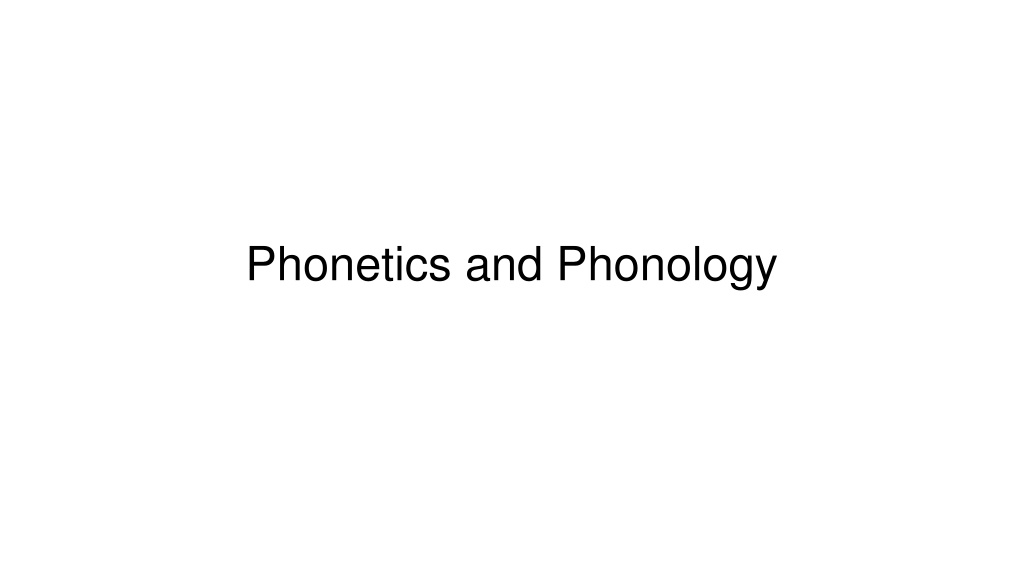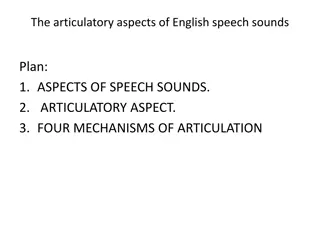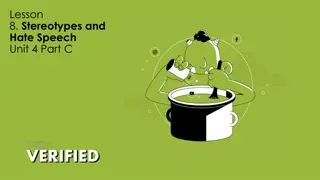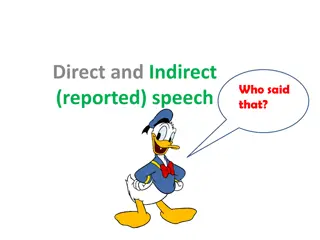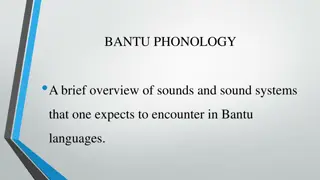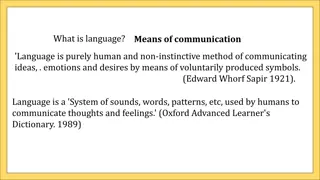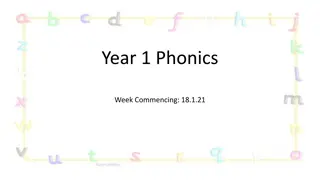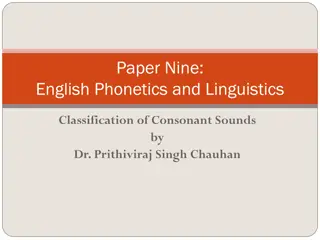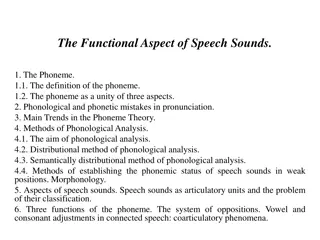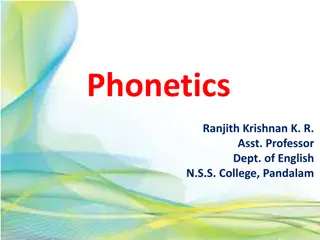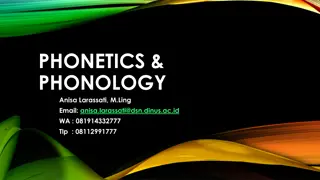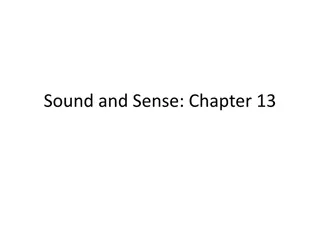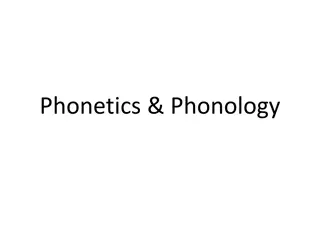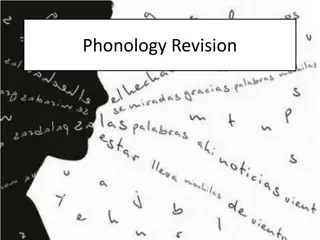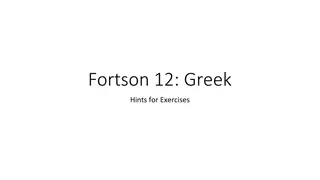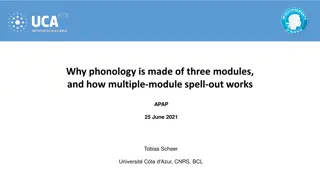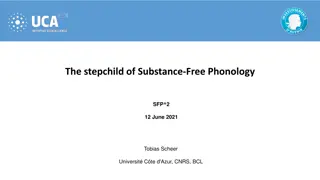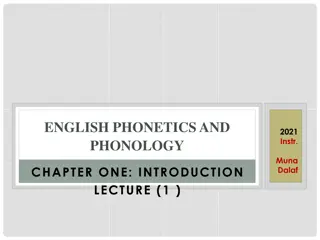Understanding Phonology: The Study of Speech Sounds in Language
Phonology is a branch of linguistics that focuses on the organization and usage of speech sounds in natural languages, with phonemes being the smallest units of sound that carry meaning. This field explores the sound structure of languages, highlighting the variety of phonemes present across different languages, including English. Through phonology, researchers delve into the distinctive phonemes that define languages and their varying numbers, offering insights into the complexity and richness of human speech.
Download Presentation

Please find below an Image/Link to download the presentation.
The content on the website is provided AS IS for your information and personal use only. It may not be sold, licensed, or shared on other websites without obtaining consent from the author. Download presentation by click this link. If you encounter any issues during the download, it is possible that the publisher has removed the file from their server.
E N D
Presentation Transcript
Agenda Natural Language Understanding (NLU) Phonetics and Phonology Phonology Definition Phonetics Vs Phonology Interests in Phonetics Types of Phonetics Articulatory phonetics Acoustic phonetics instrumental phonetics Auditory phonetics forensic phonetics Natural Language Processing (NLP) by Rahman Ali, Lect: QACC, UOP 2 25 September 2024
Phonology: definition Ref [Daniel Jurafsky, Speech and Language Processing: An Introduction to Natural Language Processing, Computational Linguistics and Speech Recognition.] Natural Language Processing (NLP) by Rahman Ali, Lect: QACC, UOP 3 25 September 2024
Phonology: Phoneme Phoneme A phoneme is the smallest meaningful unit of sound in the human language. Example The phonemes /R/ and /L/ Rip Lip The phonemes /R/ and /L/ serve to distinguish the word Rip from the word Lip. Natural Language Processing (NLP) by Rahman Ali, Lect: QACC, UOP 4 25 September 2024
Phonology: definition Phonology: The study of phonemes of a language is called phonology. Natural Language Processing (NLP) by Rahman Ali, Lect: QACC, UOP 5 25 September 2024
Phonology: definition Phonology is the study of the sound structure of a language. Ref http://clas.mq.edu.au/phonetics/phonology/structure/index.html, Retrieved date: Oct 16, 2010.] [Jonathan Harrington, phonetics and phonology. Retrieved from: Natural Language Processing (NLP) by Rahman Ali, Lect: QACC, UOP 6 25 September 2024
Phonology: definition Phonology is a branch of linguistics, which studies the manners of organization and usage of the speech sounds in natural languages. Ref angielski.info/linguistics/phonology.htm, Retrieved date: Oct 16, 2010.] [Kamil Wi niewski, July 12th, 2007, Phonology. Retrieved from: http://www.tlumaczenia- Natural Language Processing (NLP) by Rahman Ali, Lect: QACC, UOP 7 25 September 2024
Phonology (Cont..) All languages have a set of such distinctive phonemes. Majority of languages have about 30 phonemes, but there are some that have as few as 11 or as many as almost 150. The English language has about 43 phonemes, depending on the variety of English in question. Natural Language Processing (NLP) by Rahman Ali, Lect: QACC, UOP 8 25 September 2024
Phonetics: definition Phonetics is a branch of linguistics that comprises the study of the sounds of human speech. It is concerned with the physical properties of speech sounds (phones), and the processes of their physiological production, auditory reception, and neurophysiological perception Natural Language Processing (NLP) by Rahman Ali, Lect: QACC, UOP 9 25 September 2024
Phonology Vs Phonetics Phonology phonology is more abstract and focuses psychological functional perspective concern with patterns of sounds concern representation of words Phonetics is production interpretation of sounds not concern with sounds to other speech sounds concern pronunciation words about the and on and relations with with of Natural Language Processing (NLP) by Rahman Ali, Lect: QACC, UOP 10 25 September 2024
Interests in Phonetics How children learn the sounds of their first language? What can be done in cases of speech and hearing defects? How is speech perceived and produced. Deals with investigating ways of successful foreign language pronunciation teaching and designing means of speech synthesis. Natural Language Processing (NLP) by Rahman Ali, Lect: QACC, UOP 11 25 September 2024
Types of Phonetics As phonetics is interested in the way in which humans produce, transmit and receive speech therefore it is sub-divided according to the focus of investigations. articulatory phonetics Acoustic phonetics instrumental phonetics Auditory phonetics forensic phonetics Kamil Wi niewski, July 12th, 2007, Phonology. Retrieved from: http://www.tlumaczenia-angielski.info/linguistics/phonetics.htm, Retrieved date: Oct 16, 2010. Natural Language Processing (NLP) by Rahman Ali, Lect: QACC, UOP 12 25 September 2024
Types of phonetics: articulatory Articulatory phonetics Articulatory phonetics deals with the processes that take place in the vocal tract when humans produce speech sounds. So, it takes into consideration the use of the vocal organs, muscle contractions, the airflow and pressure in the vocal tract, as well as intonation, phonation (modulations of the airstream), together with various manners of articulation . The properties of each sound are analyzed by the articulatory phonetics. Natural Language Processing (NLP) by Rahman Ali, Lect: QACC, UOP 13 25 September 2024
Types of phonetics: acoustic Acoustic phonetics Acoustic phonetics studies the physical features of speech sounds as they are sent from mouth to ears. Acoustic phonetics, which deals only with human speech sounds. Natural Language Processing (NLP) by Rahman Ali, Lect: QACC, UOP 14 25 September 2024
An Overview of the Vocal Tract An Overview of the Vocal Tract Robert Mannell http://clas.mq.edu.au/phonetics/phonetics/introduction/vocaltract.html, Retrieved: Oct 16,2010 Natural Language Processing (NLP) by Rahman Ali, Lect: QACC, UOP 15 25 September 2024
Types of phonetics: instrumental Instrumental phonetics Deals with the transmission of all types of sounds, by means of computers, telephones, microphones and other instruments. Because of the very nature of speech sounds, and the way they disperse in the air, it is difficult to analyze their properties without the use of the instruments mentioned above, therefore many methods of inquiry have been adopted. Natural Language Processing (NLP) by Rahman Ali, Lect: QACC, UOP 16 25 September 2024
Types of phonetics: auditory Auditory phonetics focuses on how speech sounds are perceived by the listeners, how they are heard and interpreted As articulatory phonetics studies the speech sounds from the point of view of the speaker, auditory phonetics analyses them from the point of view of the listener. Natural Language Processing (NLP) by Rahman Ali, Lect: QACC, UOP 17 25 September 2024
Types of phonetics: forensic Forensic phonetics That deals with Speaker verification: used to verify a person s identity when they are unseen Speaker identification: identifying an unknown person from speech samples Natural Language Processing (NLP) by Rahman Ali, Lect: QACC, UOP 18 25 September 2024
Reading/References Yule G. 1996. The study of language. Cambridge: CUP. Brown K. (Editor) 2005. Encyclopedia of Language and Linguistics - 2nd Edition. Oxford: Elsevier. Crystal D. 2005, The Cambridge encyclopedia of the English language - 2nd edition. Cambridge: CUP. Wilson R. A. (Editor) 1999. The MIT encyclopedia of cognitive sciences. London: The MIT Press. Daniel Jurafsky, Speech and Language Processing: An Introduction to Natural Language Processing, Computational Linguistics and Speech Recognition. Kamil Wi niewski, July 12th, 2007, Phonology. angielski.info/linguistics/phonology.htm, Retrieved date: Oct 16, 2010. Retrieved from: http://www.tlumaczenia- Natural Language Processing (NLP) by Rahman Ali, Lect: QACC, UOP 19 25 September 2024
